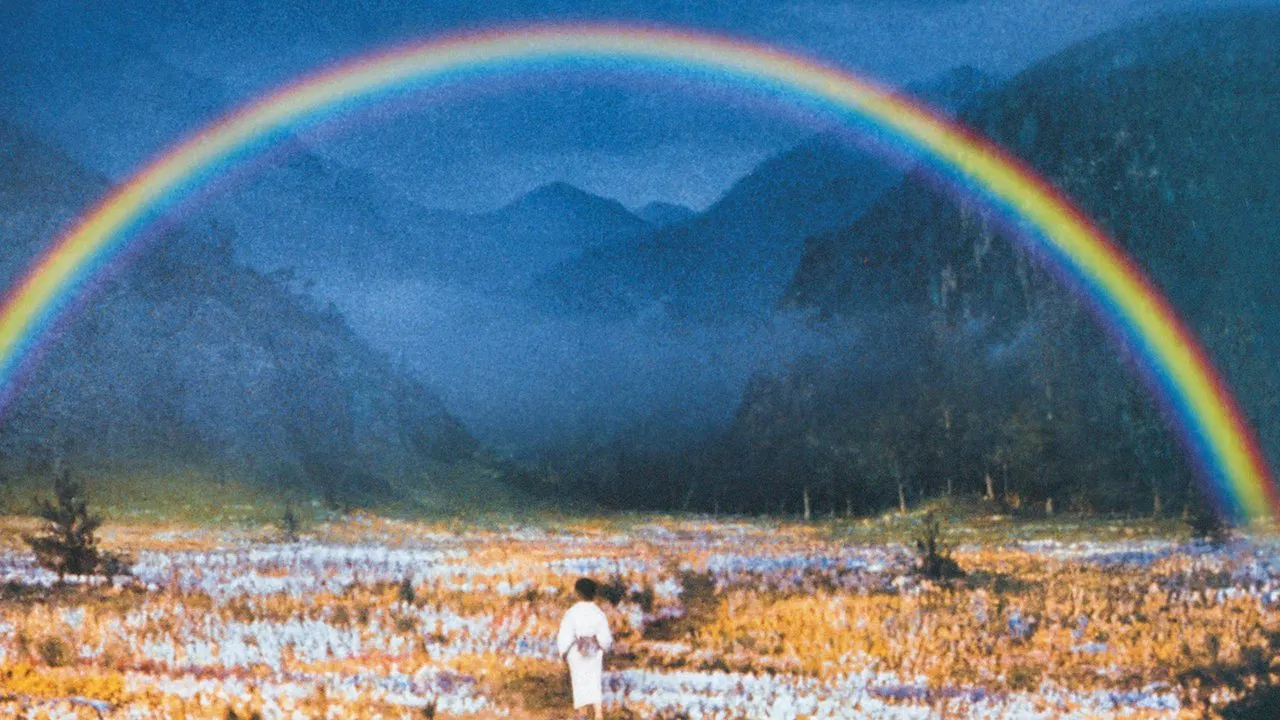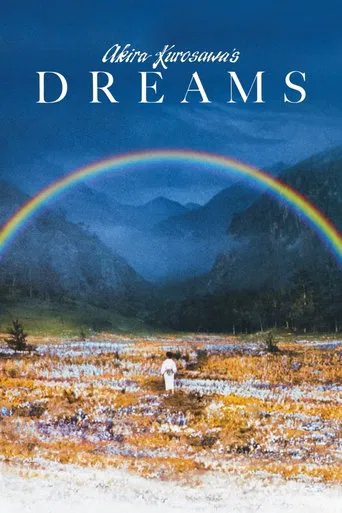

Purely Joyful Movie!
... View MoreFar from Perfect, Far from Terrible
... View MoreExcellent but underrated film
... View MoreThis is a small, humorous movie in some ways, but it has a huge heart. What a nice experience.
... View MoreDo you ever wake up from a dream and think to yourself, "Whoa, that could be a movie". Perhaps this is exactly what the director of Dreams thought to himself. Dreams is a film directed by Japanese filmmaker Akira Kurosawa in 1990. This film is an extremely artistic and interesting portrayal of a compelling perspective of the relationship between human and the environment. Just like in actual dreams, things aren't necessarily always realistic. This approach works well for the film because it creates the illusion that you are stepping into Kurosawa's mind and dreams. It is an extremely organized film made up of eight short films. Each one is like an episode to represent a different dream of Kurosawa. On the surface, these dreams might seem senseless, bizarre, or even creepy. But on a deeper level, the dreams are elaborately portrayed to signify a message to the audience about the environment; a warning. Here is a little about why Dreams deserves four stars First of all, the sound and color set a different mood in every episode. The mood is important to create the illusion of a dream—and anything can happen in dreams! There are limited amounts of dialogue in the film. This makes conversations between characters valuable because they offer important knowledge to be able to understand the message Kurosawa is making. The sound in the film makes up for the lack of words. Sound plays an extremely important role in each of the episodes. It emphasizes certain actions and dramatizes important moments in the film. The sounds are deep and are effective in creating suspense. The instruments most likely used might include traditional stringed instruments including the erhu, pipa, and guzheng, and the dizi flutes. Color is also very important and while some episodes are dark and cool, others are saturated and bright. The elements of color and sounds work hand in hand to create a suspenseful mood in each episode. There is always a sense of suspense and curiosity throughout the film—mainly because the main character of each episode plays a very particularly curious role. Since there is no main plot that follows throughout the entire film, the viewer does not know what to expect. As the viewers, we follow the main character in their curiosity. Truly, this film is unlike anything you have seen before. To give you an idea of what each of the dreams is like, I'll describe two of them. The film begins with the first dream titled, Sunshine Through the Rain. This episode sets the mood for the rest of the film. A little boy disobeys his mother's orders and witnessed something that humans are not supposed to see. As the boy travels through the forest, he finds foxes performing their traditional wedding ceremony. The little boy watches extremely carefully—it makes the viewer feel on edge. The sound and color effectively help create this suspense. As he hides behind a thick redwood tree, the foxes continue their ceremony believing that nobody is watching them. But the viewer holds their breath every time the foxes come to an immediate halt when they hear a noise and feel they're being watched; but the boy successfully hides behind the tree once again. The boy manages to hide only a handful of times during the foxes' wedding procession before he is suddenly caught. And as the saying goes, "curiosity killed the cat!" On a deeper level, this is saying is exactly what Kurosawa's message is.Here, Kurosawa is arguing that although knowledge is important for human survival, nature is something that we shouldn't be disrupting. The disruption of nature can result in tragic consequences for humans. In the episode, the boy represents mankind. Essentially, all the boy did is look at the foxes. But Kurosawa is also saying that human presence in nature is enough to change it. Animals do not act the same when humans are around. Furthermore, the boy's curiosity manifests the recent human effort to conquer the environment and manipulate everything it has to offer for self-interest and personal gain. My favorite episode is titled, "The Tunnel". It opens up with a Japanese army commander walking through a dark tunnel. The mood continues to be suspenseful as the man is surprised by a furious dog barking angrily at him. As the episode continues, the man is then surprised by another army man—but this man is a dead. His face is painted completely and I must say, very frighteningly. The dead army man struggles to admit that he has died in combat. After a symbolic conversation with the commander, he is convinced that he must leave the real world and continue into the afterlife along with an enormous group of army men who were stuck in the same place too. Both of these dreams manifest a warning to mankind. The relationship we have with the environment is one we need to care for with great patience and respect. But as depicted in various of the dreams, man only continues to take steps closer to their death as we find new ways to ignore nature's warning and manipulate it to our advantage.
... View MoreGreat movie, Amazon spoiler: wanted to buy it and found that only way to buy it is to use it on a kindle. I don't want a kindle! I don't want kindle software on my computer! I thought I was buying a CD that would play on *my computer. And I agree 10 bucks is a fair price for the CD. But oh no, to find out about the kindle, you have to buy the CD. There is no returning the Kindle software. I figure, if Amazon is that hard up for 10 bucks, sucks, maybe they deserve it! Plus, they want ten lines about Amazon service. Well OK, Amazon has been good over the years. Until this time I've never had a problem with them. They, or there partners have simply taken my money and provided me with a product. Seems fair. Eventually Amazon does not feel this is a fair, although you can buy this particular CD anywhere for 10 bucks. Why Amazon feels that what I watch needed to be part of Kindle world; and I why I to pay to be part of the data base is somewhat amazing.
... View MoreOf the few Kurosawa films i've so far seen, Dreams is the first one in color. Concerning the images on screen this film is beautiful. Kurosawa could truly make his films look like paintings. In a time where idiot reviewers can call 'The A-Team' poetry in motion, this film and other masterpieces will forever be underrated. Funnily enough, of all the films I've seen, I would relate this to a slightly inferior 2001. The reason is the scant dialogue and brutally slow moving scenes. This is one of the reasons I am not the ultimate Space Odyssey fan, because you really have to be in the right interprative mood. This is also what Dreams suffers and thrives from, a snail's pace.There are pros and cons to each 'Dream' and I will mention each. When talking about slow pace, the one that suffers the most is 'The Blizzard'. This section, while entertaining, is the simplest of stories, and it drags on for too long. Although I'm contradicting myself,some Dreams are too talky- mostly 'the Tunnel', 'Village Of The Watermills',and 'the Weeping Demon' (in my opinion the weakest of the sections) in which half the dream seems to be comprised of a shot of a character talking in a very obvious way about some thematic statement. 'Sunshine Through The Rain' and 'The Peach Orchard' seem to end far too abruptly with most of the Dream being a Kabuki-esquire dance sequence. 'Mount Fuji in Red' is a scathing rant at all things Nuclear and in it's 2 scenes happens to have one of the films highlights and low points. Scene one of the Dream is a really scary Godzilla meets An Inconveniant Truith section that is ironic and unsettling. Part 2 is an overacted, preachy and talkative killer of momentum. Overall my second best.In my humble opinion, the best dream is 'Crows' because it combines the best use of cinematography and weaves it into the story, as well as blending silence with dialogue. This is the only Dream that isn't too preachy or too slow and is perhaps one of the most visceral things Kurosawa has done. The final sequence that has something to do with crows (no spoilers) took me completely by surprise and sent a chill down my spine. Capturing the surreal, enchanting and slightly unsettling feeling of Dreaming.I know I've taken a few hits at this film but thats only because it's not perfect. It's certainly not Kurosawa's best (in my Opinion that's Rashomon) but the truith is that it's cinematically ingenious. In a world where banal stupidity thrives (cough TRANSFORMERS cough)and gets a fair amount of undeserved praise, on Rotten Tomatoes this film currently gets a 53%! That makes me angry! Watch this movie and see what you think...
... View Morei have been hearing about Akira Kurosawa's movies for a long time,but was not able to lay my hands on one till today!and his reputation did precede him...dreams is a collection of eight short dreams which was said to be dreamed by Kurosawa himself !most of the dreams is a beautifully pictured social commentary on modern life,and how science is destroying the beauty of the actual lives and the small little things that are really important! the peach orchard gives the message on deforestation and cutting of trees,the blizzard and the tunnel(two nightmares) gives different concepts of death and defeat,mount Fuji in red and the weeping demon gives the message about modern nuclear weapons and their ill effects... crows is the most beautiful dream,in which the dreamer travels through the paintings of artist van Gogh(played by martin Scorsese)...the transformation from painting to real life is really brilliant but my favorite dream is the last one village of the watermills,which makes u realize that technology and science necessarily do not bring a happy and full life!the two most important things in life is clean water and clean air!most of the dreams do not have any plot,actually they do not need one...they are very strong by themselves!it will seem that they are surreal dreams dreamed by a socially responsible person...and leaves a deep impression on ones mind!!it may be a little slow,but if u see through it,the way u view your life may change!9.5/10
... View More